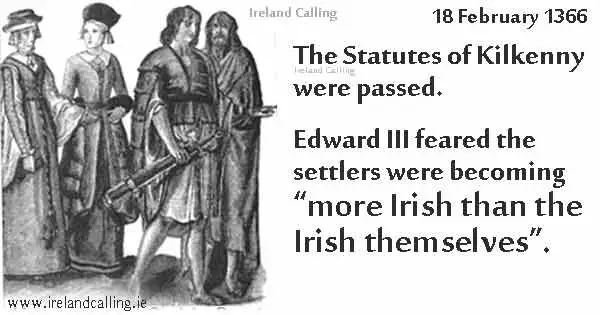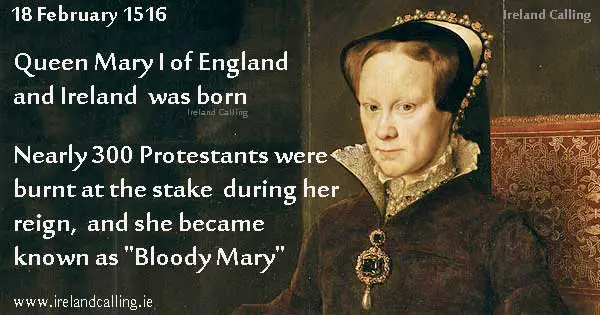february-top.html
1366 On this day in 1366, a piece of legislation, the Statutes of Kilkenny, were passed at a meeting of the Irish parliament held at Kilkenny. It was an attempt to curb the adoption of Irish customs and cultures by Anglo-Norman settlers in Ireland. Its aim was to by reassert English culture among the English settlers.
Edward III of England feared that the settlers were becoming “more Irish than the Irish themselves”. He was alarmed that the Anglo-Irish were becoming too powerful and threatened his rights and interests in Ireland.
These laws were intended to give control of Ireland back to English born nobles, not English descendants in Ireland. It was treason to break any of the laws which could lead to the death sentence.

The Statute of Kilkenny aimed to separate the English from the Irish. It was against the law for the English in Ireland to:
- Native English were not allowed to marry native Irish
- Adopt an Irish child
- The English couldn’t have Irish names
- The English were not allowed to wear Irish clothes (fine £100)
- Speak the Irish language
- Play Irish music
- Listen to Irish story-tellers and minstrels who the English suspected of being spies
- Play Irish games like “hockie” and “coiting”. Archery and lancing were encouraged
- Let an Irish person join an English religious house
- Appoint any Irish clergyman to any church in the English settlement
- Ride a horse in Irish style, that is, without a saddle
Because of the poor resources, the laws weren’t implemented. The English were not able to make people obey the new laws, and the Anglo-Irish ignored them
* * *
1516 Queen Mary of England and Ireland was born on this day in 1516. She was given the name “Bloody Mary” because of the persecution of Protestants during her reign. When she took over the throne, she changed the national religion back to Catholicism, and had any dissenters executed.
During her five year rule, it is estimated that more than 300 Protestants were killed, with the preferred method of execution not being hung or beheaded, but burnt at the stake.

Daingean in Co Offaly was originally called Philipstown in King’s County in 1556, after Mary’s husband King Philip of Spain. The midlands town of Portlaoise was originally called ‘Maryborough’ to honour Queen Mary of England. The town was established by an act of Parliament during her reign in 1557.
* * *
1935 Ciarán Bourke, one of the founding members of the Dubliners, was born on 18th February in 1935. He grew up in Dublin and after playing in local pubs, Bourke, Ronnie Drew, Barney McKenna and Luke Kelly became the Dubliners.
The band is still going today, albeit with a brand new line-up, called The Dublin Legends.
Click here to read more about the Dubliners
The Dubliners and Ciaran Bourke performing the Donegal Reel/Longford Collector – real foot-tapping music.
* * *
1978 Police in Northern Ireland arrested 20 suspected IRA members on this day in 1978, following the previous day’s petrol bomb attack on La Mon restaurant in County Down in which 12 people were killed.
february-bottom.html